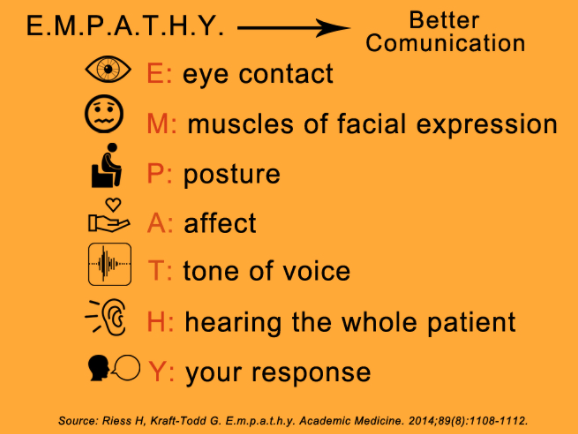What is empathy?
Empathy is “the ability to understand and share the feelings of another.” It is recognizing someone’s fears, frustrations, and feelings and feeling with them. In other words, it is putting yourself in another’s shoes. Empathy is often confused with sympathy, but the distinction is important. Sympathy is when you have an emotional response to a person’s suffering, but you do not try to understand and feel their pain. With sympathy, you may feel sad for that person, but there is still a kind of detachment that is not present with empathy. Empathy is more of a skill rather than simply an emotional response, one that can be learned and improved upon over time. Those in healthcare can use empathetic understanding to provide the most effective, individualized care for each patient. 
What does empathy look like in healthcare, and how can you ensure it is at the core of your practice?
Empathy in healthcare is identifying how a person really feels, seeing the situation through their eyes, and making an informed decision about the best treatment plan. Taking into account the uniqueness of each patient, and their individual needs and concerns ensures that you are able to provide them with the best possible solution. Understand the patients fears and frustrations in order to understand how best to help them. Keep in mind that how a person is really feeling is displayed just as much in a person’s nonverbal communication, body language, and demeanor as in what they say. Pay attention to more than just what they say to tune into how they are truly feeling. Empathy in healthcare requires attentive listening and being open to criticism and feedback. Have patients take an outpatient survey, and take how you made your patient feel seriously. It is true that people come to the doctor for a solution to the problem, but they also want to feel heard, listened to, and respected. The key, simply put, is to give the patient your whole attention.
Does an empathetic approach really improve patient outcome?
Studies confirm, yes! You can check out a few of them here. The numerous studies that explore how empathy affects healthcare attest to just how many people are recognizing its importance and relativity. How you make your patients feel does matter. Being treated by someone who has really taken the time to understand your situation improves your satisfaction with your care, and in turn can improve your attitude and motivation to commit to your health. Higher patient compliance and satisfaction is not the only upside of an empathetic approach to healthcare. The business side of this approach is just as rewarding. According to a survey conducted by Software Advice, 72% of patients used online reviews as a first step to seeking providers. 91% of patients reported to be “moderately likely” to choose one similarly qualified doctor over another based on positive reviews. Higher patient satisfaction leads to more positive reviews, which has a high potential for more patients. Additionally, research has shown that an increase in empathy shown by healthcare providers leads to a tangible increase in trust. Trust between patient and physician is a critical component of successful treatment. The tendency to detach can come easily for many in a field where you see suffering, and discomfort every day. Showing and feeling empathy day in and day out is not easy, but when the stress of poor health is met with empathy and understanding, the outcome is guaranteed to be better for both the patient and the healthcare provider.
Using Empathy Well
A final aspect of empathy to understand is that it does not look the same in every situation. It is important to recognize that since a large part of empathy is understanding how a person feels, there is no “one size fits all” response. For example, if someone feels vulnerability or shame, they will most likely not respond well to gentle compassion that can be mistaken for pity. In this situation, it may be more conducive to approach the situation with strength, positivity, and a sense of action. While people always need to be understood and listened to, not everyone needs that tenderness that is often associated with empathy. This is what makes empathy such a skill, the need to be so in tune with another person’s inner feelings. It is even more so about what they do not say, as what they say. True empathy utilizes emotional and nonverbal cues to achieve the most accurate understanding of a person’s feelings. While it takes practice, focus, and engagement, empathy is such a worthwhile trait to develop and make a part of every day practice.
